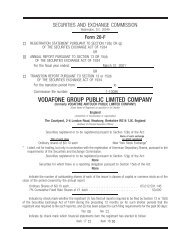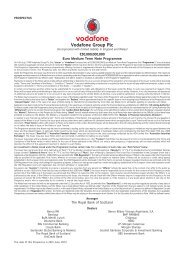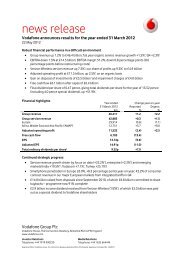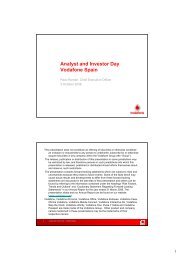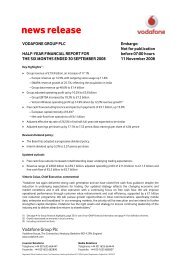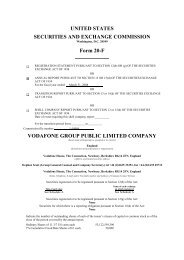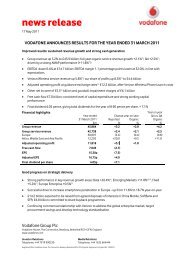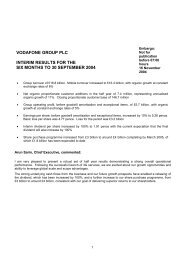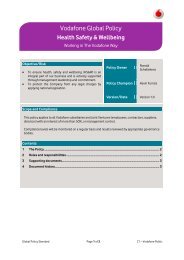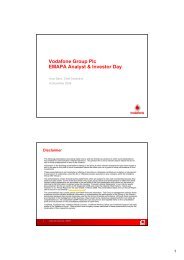You also want an ePaper? Increase the reach of your titles
YUMPU automatically turns print PDFs into web optimized ePapers that Google loves.
<strong>Vodafone</strong> – Performance<br />
Principal Risk Factors and Uncertainties<br />
Regulatory decisions and changes in <strong>the</strong> regulatory environment could<br />
adversely affect <strong>the</strong> Group’s business.<br />
Because <strong>the</strong> Group has ventures in a large number of geographic areas, it must<br />
comply with an extensive range of requirements that regulate and supervise <strong>the</strong><br />
licensing, construction and operation of its telecommunications networks and<br />
services. In particular, <strong>the</strong>re are agencies which regulate and supervise <strong>the</strong> allocation<br />
of frequency spectrum and which monitor and enforce regulation and competition<br />
laws which apply to <strong>the</strong> mobile telecommunications industry. Decisions by<br />
regulators regarding <strong>the</strong> granting, amendment or renewal of licences, to <strong>the</strong><br />
Group or to third parties, could adversely affect <strong>the</strong> Group’s future operations in<br />
<strong>the</strong>se geographic areas. The Group cannot provide any assurances that governments<br />
in <strong>the</strong> countries in which it operates will not issue telecommunications licences to<br />
new operators whose services will compete with it. In addition, o<strong>the</strong>r changes in<br />
<strong>the</strong> regulatory environment concerning <strong>the</strong> use of mobile phones may lead to a<br />
reduction in <strong>the</strong> usage of mobile phones or o<strong>the</strong>rwise adversely affect <strong>the</strong> Group.<br />
Additionally, decisions by regulators and new legislation, such as those relating to<br />
international roaming charges and call termination rates, could affect <strong>the</strong> pricing<br />
for, or adversely affect <strong>the</strong> revenue from, <strong>the</strong> services <strong>the</strong> Group offers. Fur<strong>the</strong>r<br />
details on <strong>the</strong> regulatory framework in certain countries and regions in which <strong>the</strong><br />
Group operates, and on regulatory proceedings can be found in “Regulation” on<br />
page 147.<br />
Increased competition may reduce market share or revenue.<br />
The Group faces intensifying competition. Competition could lead to a reduction<br />
in <strong>the</strong> rate at which <strong>the</strong> Group adds new customers and to a decrease in <strong>the</strong> size<br />
of <strong>the</strong> Group’s market share as customers choose to receive telecommunications<br />
services, or o<strong>the</strong>r competing services, from o<strong>the</strong>r providers. Examples include,<br />
but are not limited to, competition from internet based services and MVNOs.<br />
The focus of competition in many of <strong>the</strong> Group’s markets continues to shift<br />
from customer acquisition to customer retention as <strong>the</strong> market for mobile<br />
telecommunications has become increasingly penetrated. Customer deactivations<br />
are measured by <strong>the</strong> Group’s churn rate. There can be no assurance that <strong>the</strong> Group<br />
will not experience increases in churn rates, particularly as competition intensifies.<br />
An increase in churn rates could adversely affect profitability because <strong>the</strong> Group<br />
would experience lower revenue and additional selling costs to replace customers.<br />
Increased competition has also led to declines in <strong>the</strong> prices <strong>the</strong> Group charges for<br />
its mobile services and is expected to lead to fur<strong>the</strong>r price declines in <strong>the</strong> future.<br />
Competition could also lead to an increase in <strong>the</strong> level at which <strong>the</strong> Group must<br />
provide subsidies for handsets. Additionally, <strong>the</strong> Group could face increased<br />
competition should <strong>the</strong>re be an award of additional licences in jurisdictions in<br />
which a member of <strong>the</strong> Group already has a licence.<br />
Delays in <strong>the</strong> development of handsets and network compatibility and<br />
components may hinder <strong>the</strong> deployment of new technologies.<br />
The Group’s operations depend in part upon <strong>the</strong> successful deployment of<br />
continuously evolving telecommunications technologies. The Group uses<br />
technologies from a number of vendors and makes significant capital expenditures<br />
in connection with <strong>the</strong> deployment of such technologies. There can be no<br />
assurance that common standards and specifications will be achieved, that <strong>the</strong>re<br />
will be inter-operability across Group and o<strong>the</strong>r networks, that technologies will<br />
be developed according to anticipated schedules, that <strong>the</strong>y will perform according<br />
to expectations or that <strong>the</strong>y will achieve commercial acceptance. The introduction<br />
of software and o<strong>the</strong>r network components may also be delayed. The failure of<br />
vendor performance or technology performance to meet <strong>the</strong> Group’s expectations<br />
or <strong>the</strong> failure of a technology to achieve commercial acceptance could result<br />
in additional capital expenditures by <strong>the</strong> Group or a reduction in profitability.<br />
52 <strong>Vodafone</strong> Group Plc Annual Report 2008<br />
Expected benefits from cost reduction initiatives may not be realised.<br />
The Group has entered into several cost reduction initiatives principally relating<br />
to <strong>the</strong> outsourcing of IT application development and maintenance, data centre<br />
consolidation, supply chain management and a business transformation<br />
programme to implement a single, integrated operating model using one ERP<br />
system. However, <strong>the</strong>re is no assurance that <strong>the</strong> full extent of <strong>the</strong> anticipated<br />
benefits will be realised.<br />
Changes in assumptions underlying <strong>the</strong> carrying value of certain Group<br />
assets could result in impairment.<br />
<strong>Vodafone</strong> completes a review of <strong>the</strong> carrying value of its assets annually, or more<br />
frequently where <strong>the</strong> circumstances require, to assess whe<strong>the</strong>r those carrying<br />
values can be supported by <strong>the</strong> net present value of future cash flows derived<br />
from such assets. This review examines <strong>the</strong> continued appropriateness of <strong>the</strong><br />
assumptions in respect of highly uncertain matters upon which <strong>the</strong> carrying<br />
values of certain of <strong>the</strong> Group’s assets are based. This includes an assessment of<br />
discount rates and long term growth rates, future technological developments<br />
and timing and quantum of future capital expenditure, as well as several factors<br />
which may affect revenue and profitability identified within o<strong>the</strong>r risk factors<br />
in this section such as intensifying competition, pricing pressures, regulatory<br />
changes and <strong>the</strong> timing for introducing new products or services. Due to <strong>the</strong><br />
Group’s substantial carrying value of goodwill under IFRS, <strong>the</strong> revision of any of<br />
<strong>the</strong>se assumptions to reflect current or anticipated changes in operations or <strong>the</strong><br />
financial condition of <strong>the</strong> Group could lead to an impairment in <strong>the</strong> carrying value<br />
of certain assets in <strong>the</strong> Group. While impairment does not impact <strong>report</strong>ed cash<br />
flows, it does result in a non-cash charge in <strong>the</strong> Consolidated Income Statement<br />
and thus no assurance can be given that any future impairments would not affect<br />
<strong>the</strong> Company’s <strong>report</strong>ed distributable reserves and <strong>the</strong>refore its ability to make<br />
distributions to its shareholders or repurchase its shares. See “Critical Accounting<br />
Estimates” on page 85.<br />
The Group’s geographic expansion may increase exposure to<br />
unpredictable economic, political and legal risks.<br />
Political, economic and legal systems in emerging markets historically are less<br />
predictable than in countries with more developed institutional structures.<br />
As <strong>the</strong> Group increasingly enters into emerging markets, <strong>the</strong> value of <strong>the</strong> Group’s<br />
investments may be adversely affected by political, economic and legal<br />
developments which are beyond <strong>the</strong> Group’s control.<br />
Expected benefits from acquisitions may not be realised.<br />
The Group has made significant acquisitions, which are expected to deliver<br />
benefits resulting from <strong>the</strong> anticipated growth potential of <strong>the</strong> relevant markets.<br />
However, <strong>the</strong>re is no assurance as to <strong>the</strong> successful integration of companies<br />
acquired by <strong>the</strong> Group or <strong>the</strong> extent to which <strong>the</strong> anticipated benefits resulting<br />
from <strong>the</strong> acquisitions will be achieved.<br />
The Company’s strategic objectives may be impeded by <strong>the</strong> fact that it<br />
does not have a controlling interest in some of its ventures.<br />
Some of <strong>the</strong> Group’s interests in mobile licences are held through entities in<br />
which it is a significant but not controlling owner. Under <strong>the</strong> governing documents<br />
for some of <strong>the</strong>se partnerships and corporations, certain key matters such as <strong>the</strong><br />
approval of business plans and decisions as to <strong>the</strong> timing and amount of cash<br />
distributions require <strong>the</strong> consent of <strong>the</strong> partners. In o<strong>the</strong>rs, <strong>the</strong>se matters may<br />
be approved without <strong>the</strong> Company’s consent. The Company may enter into<br />
similar arrangements as it participates in ventures formed to pursue additional<br />
opportunities. Although <strong>the</strong> Group has not been materially constrained by <strong>the</strong><br />
nature of its mobile ownership interests, no assurance can be given that its<br />
partners will not exercise <strong>the</strong>ir power of veto or <strong>the</strong>ir controlling influence<br />
in any of <strong>the</strong> Group’s ventures in a way that will hinder <strong>the</strong> Group’s corporate<br />
objectives and reduce any anticipated cost savings or revenue enhancement<br />
resulting from <strong>the</strong>se ventures.




